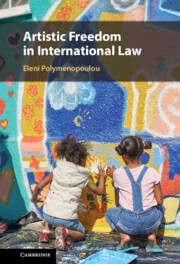Book contents
- Artistic Freedom in International Law
- Artistic Freedom in International Law
- Copyright page
- Contents
- Acknowledgements
- Table of Cases
- Introduction
- 1 Defining Art
- 2 The Nature, Scope and Protection of Artistic Freedom
- 3 Censorship and Restrictions
- 4 Positive Obligations in Relation to Artistic Freedom
- 5 Street Art, Graffiti and Art in Public Space
- 6 Public Morality, Obscenity and the Arts
- 7 Blasphemous Paintings, Cartoons and Other Religiously Offensive Art
- Index
Introduction
Published online by Cambridge University Press: 06 April 2023
- Artistic Freedom in International Law
- Artistic Freedom in International Law
- Copyright page
- Contents
- Acknowledgements
- Table of Cases
- Introduction
- 1 Defining Art
- 2 The Nature, Scope and Protection of Artistic Freedom
- 3 Censorship and Restrictions
- 4 Positive Obligations in Relation to Artistic Freedom
- 5 Street Art, Graffiti and Art in Public Space
- 6 Public Morality, Obscenity and the Arts
- 7 Blasphemous Paintings, Cartoons and Other Religiously Offensive Art
- Index
Summary
The topic of this study might appear puzzling to creative artists and art worlds,1 namely painters, musicians, dancers, film-makers, playwriters, composers, all those who make artworks or work with artists, museum staff, art faculty, gallerists, collectors, art buyers and art lovers. What does international law have to do with art? And why is there a need to write a legal monograph on a topic that is self-evident? From the perspective of the aforementioned stakeholders, arts are and should remain free. Freedom is a vital condition for the realization of the creative process.
Keywords
- Type
- Chapter
- Information
- Artistic Freedom in International Law , pp. 1 - 9Publisher: Cambridge University PressPrint publication year: 2023

